11 In Search of Lost Time…with French Past Tenses
Are you feeling nostalgic yet? Let’s take a trip down memory lane. The imparfait will allow you to express how things used to be or what you were doing yesterday. In this chapter, you’ll also learn about the literary passé simple, which translates equivalently to the passé composé.
The Imparfait
The imparfait (imperfect) is one of the most challenging tenses to master in French. Remember that the passé composé is used to talk about a past action that has taken place at a specific point in time. While the imparfait also refers to past actions, it carries more nuances; it is used to describe a state of both mind and being in addition to continuous or habitual past actions.
To form the imperfect, take the nous form of the present tense and remove the -ons ending; this will leave just the stem of the imparfait. Then add to the stem the imparfait endings (-ais, -ais, -ait, -ions, -iez, -aient).
lire to read
nous lisons → lis-

Note that the -ais, -ait, and -aient endings are pronounced the same. But verbs with spelling changes in the present tense of the nous form, such as nager and commencer (see Chapter 2), retain the spelling change only for the je, tu, il, elle, ils, and elles pronouns. Likewise, with the nous and vous form of the imparfait, the extra e or ç is not needed.
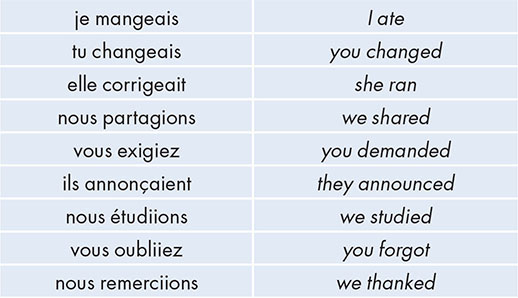
Depending on the context, the imparfait can be the equivalent to several tenses in English.

Note that the verb être is an irregular verb in the imparfait.

Let’s look at the different ways in which the imparfait is used. First, it is used in establishing backgrounds and describing past events.

Another use of the imparfait is to describe past habitual, repetitive action. Depending on context, this use of the imparfait can be translated as used to or would.

Expressions of time or repeated action are often used with the imparfait:
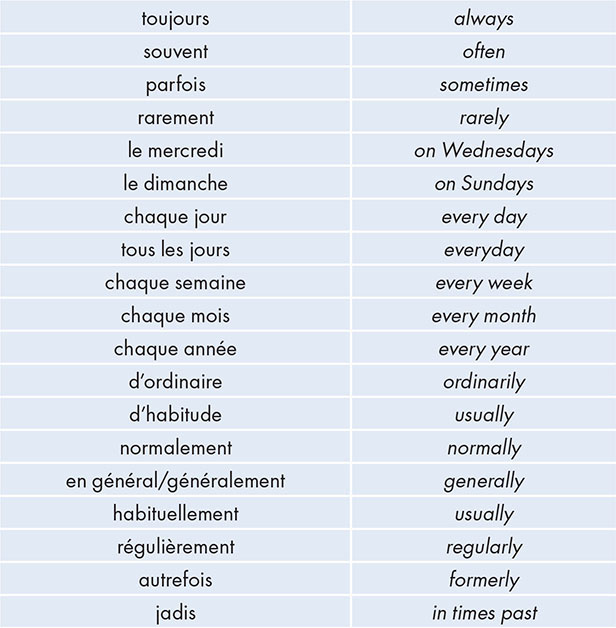
Imparfait vs. Passé Composé
The imparfait and the passé composé can sometimes be used together. For instance, when a past continuous action is interreputed by another action, both tenses are invoked. The continuous actions takes the imparfait, whereas the interrupting action takes the passé composé.

Verbs Commonly Used in the Imperfect
Some verbs appear more often in the imparfait than they do in the passé composé, largely because they express a mental or physical state. These verbs include être (to be), avoir (to have), penser (to think), croire (to believe), savoir (to know), espérer (to hope), sembler (to seem), and paraître (to appear). But when these verbs are used in the passé composé, they may take on a different meaning. Compare the examples below:
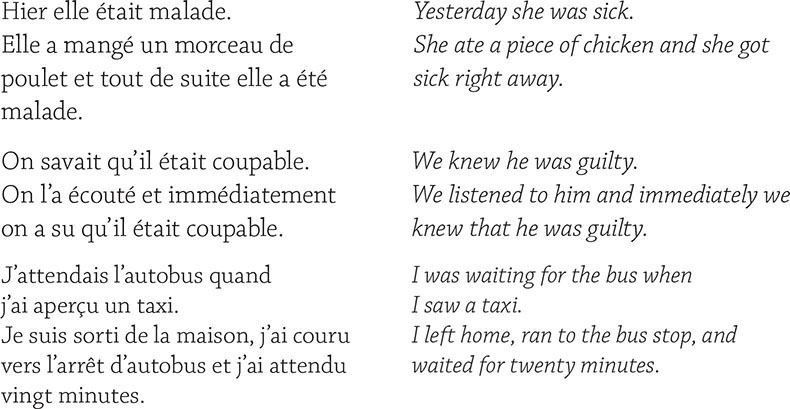
The Conjunctions Quand, Lorsque, Pendant que, Alors que, and Tandis que
All of these conjunctions can relate two or more conditions in a temporal sense, but each has different nuances. And note that each of the conjunctions are followed by verbs in the indicative.
Quand/lorsque can be translated as when.

Pendant que can be translated as “while” and indicates that two actions are simultaneous.

Alors que also indicates that two actions are simultaneous but is used to draw a contrast or contradiction between them.

Tandis que can be translated as “while” or “whereas,” and it draws the starkest contrast or tension between two actions.

The Pluperfect Tense
The plus-que-parfait (pluperfect) indicates an action that happened before another past action has begun. It is like a “past” past tense, so to speak. And it is often combined with a dependent clause stating this anteriority.
To form the plus-que-parfait, the imperfect of avoir or être is used in conjunction with the past participle of the main verb. And remember to have the past participle agree with the subject when using être!
To start, let’s review the auxiliary verbs être and avoir.





Making a Suggestion with si + on + imparfait
With a si + on construction, the imparfait is used to make a suggestion, to invite someone to do something. The informal on refers to two or more people and is conjugated in the third person singular.

You will encounter the imparfait and plus-que-parfait in other idiomatic constructions, for instance, to express a wish or a regret.


Using Depuis with the Imperfect
As you recall from Chapter 8, we have seen depuis used with the present tense and the passé composé. Depuis can be used in the imparfait when it refers to a continuous action. Note that in this case, English uses the pluperfect while French uses the imparfait.
First, let’s review the continuous action that requires the present tense:
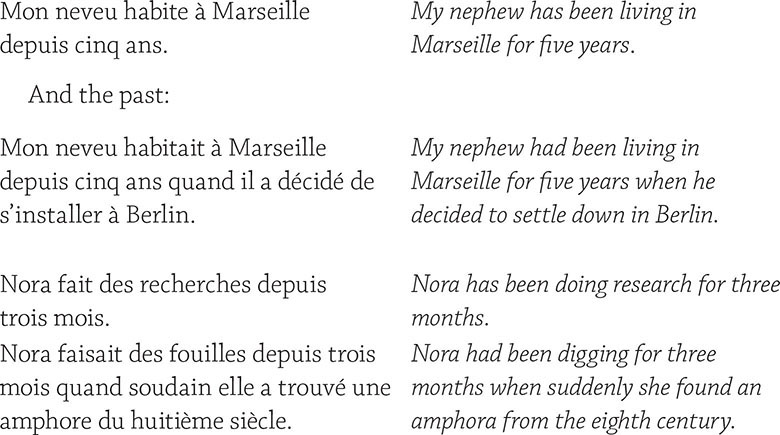
Be sure to review since, for, and ago, and practice the different usages of the tenses.
The Passé Simple
The passé simple (simple past) is a tense used mainly in written French, although it may be heard during a formal speech. It is the equivalent of the passé composé, relating to a specific action in the past. When relating events, quality newspapers use the passé simple. Scandal sheets will often use it to convey a sense of drama. When reading French literature of all periods, you need to identify the passé simple to get a full appreciation of the text. Twenty-first-century writers write in the passé simple! It is considered one of the most beautiful tenses of the French language.
The passé simple of regular -er verbs like penser (to think) is formed by adding the endings -ai, -as, -a, -âmes, âtes, and -èrent to the infinitive stem.

The same rules apply to verbs ending in -cer and -ger, adding a cedilla or an extra e.

The passé simple of regular -ir and -re verbs, like partir (to leave) and répondre (to answer), is formed by adding the endings -is, -is, -it, -îmes, -îtes, and -irent to the infinitive stem.

Avoir (to have) and être (to be) have an irregular conjugation in the passé simple.


Here are some of the verbs in the passé simple that have an irregular stem. You should start memorizing these in order to identify them when you read a newspaper or a novel. Since the passé simple is mostly found in narration, the third person singular and plural subjects (il, elle, ils, elles) are most often used. Here are some examples in the masculine and the feminine forms:
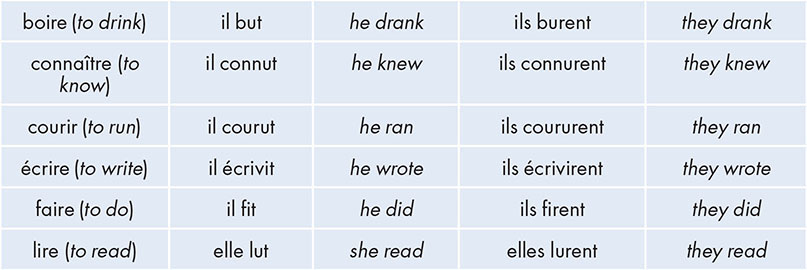
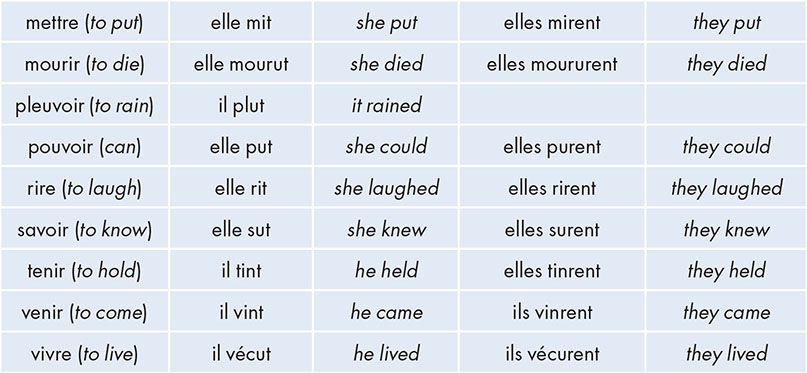
The Verb Manquer
What do you miss most from your childhood? The verb manquer carries many different meanings.
■ Manquer expresses a failure to participate in, attend, or catch something or someone:

Note that this version of manquer is not followed by a preposition.
■ Manquer de expresses an insufficient amount:

■ Manquer is also used in impersonal expressions indicating an insufficient amount:

■ Manquer à expresses a failure to meet expectations or requirements:

■ Manquer also expresses nostalgia or a longing for someone or something:

 DIALOGUE Souvenir, souvenirs…Memories, memories…
DIALOGUE Souvenir, souvenirs…Memories, memories…
Julien is spending the weekend with Céleste, his grandmother, aka Mamie, who was a history teacher. She has decided to leave her Norman town, Bayeux, to settle in Menton on the French Riviera. Julien is helping sort out some items before the big move. While going through photo albums, she is trying to decide what furniture to take to Menton.


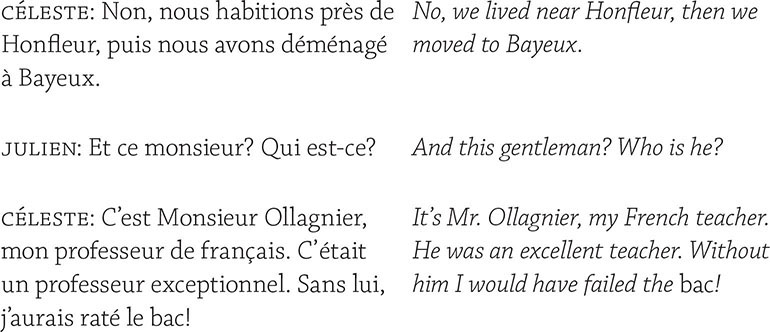
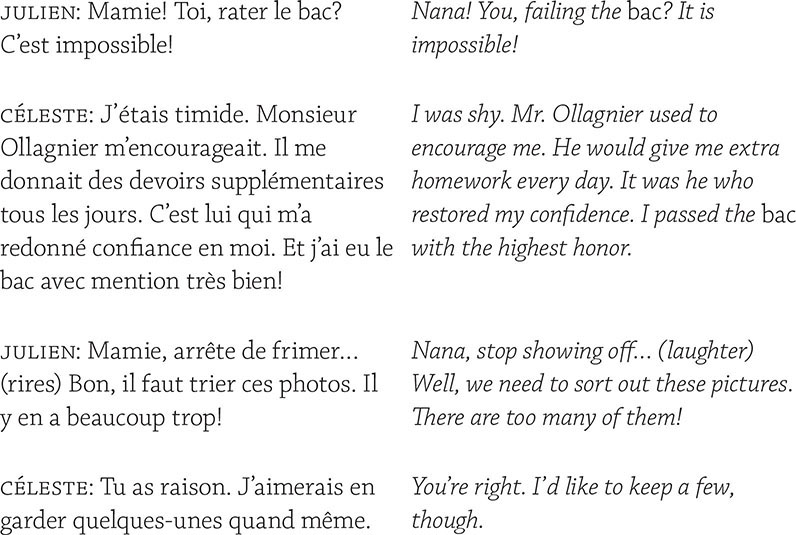

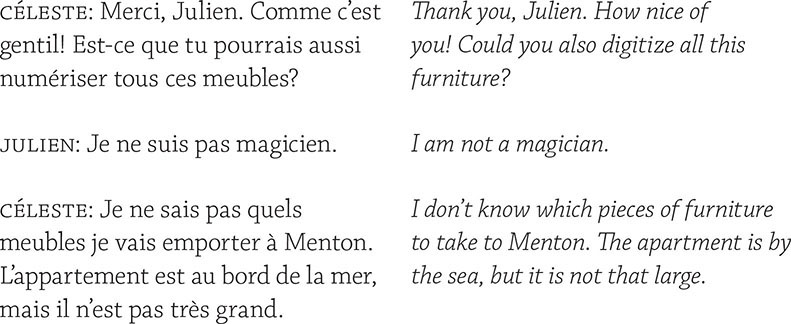


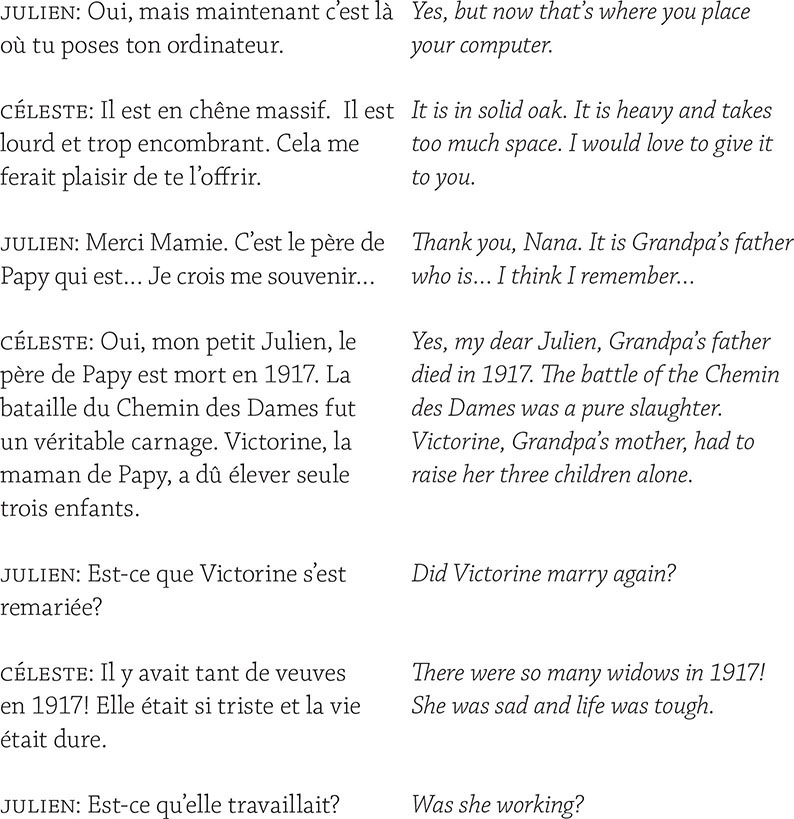
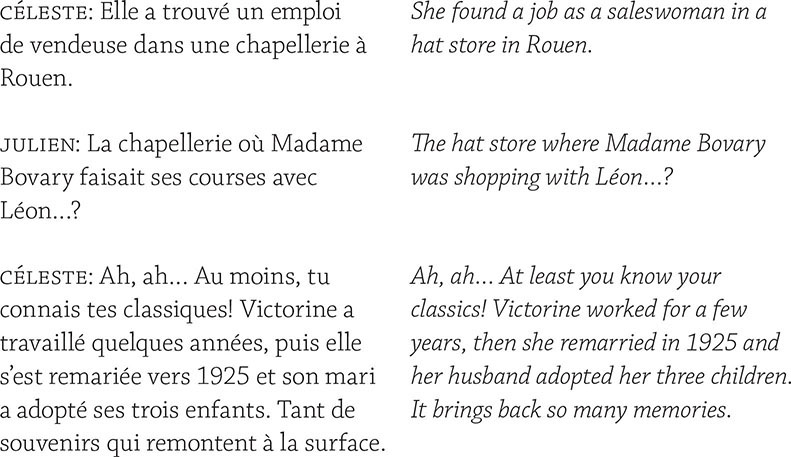
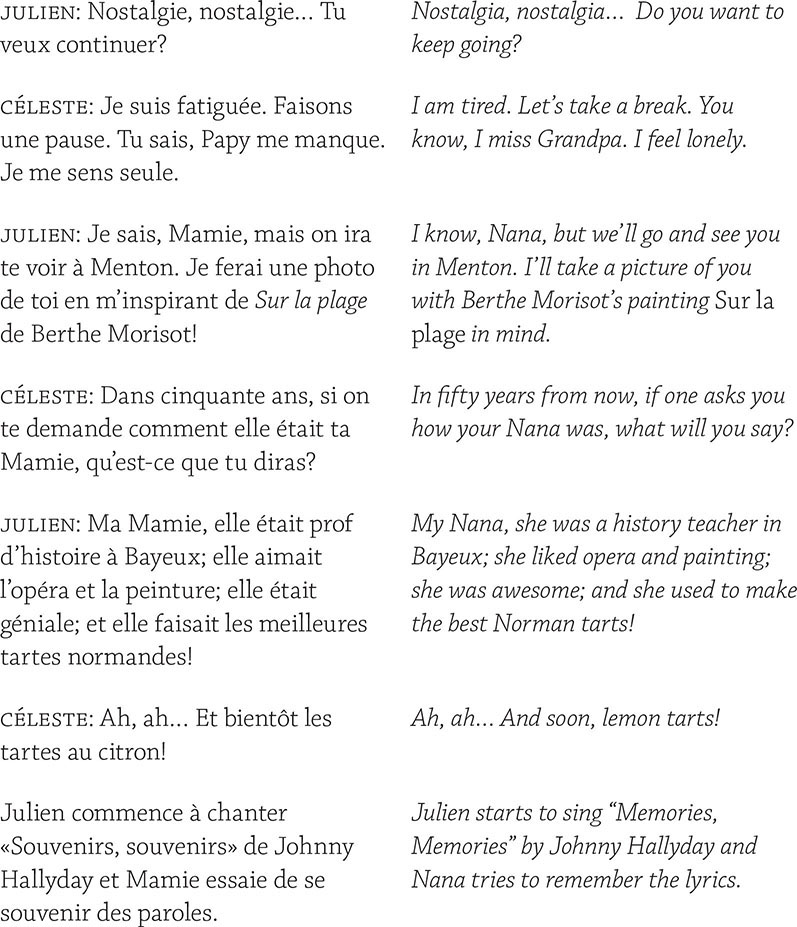

EXERCISES
EXERCISE 11.1
Conjugate the following verbs in the imperfect tense.
1. Il (faire) _______________ beau.
2. Ils (marcher) _______________ rapidement.
3. Les élèvent (avoir) _______________ tous un nouveau sac à dos.
4. Nous (suivre) _______________ des cours de danse.
5. Notre professeur (s’appeler) _______________ Monsieur Gallatin.
6. Mon père (être) _______________ passionné de musique baroque.
7. Vous (réfléchir) _______________ à la situation.
8. L’institutrice (avoir) _______________ mal à la gorge.
9. Mon frère et moi, nous (partager) _______________ une chambre.
10. Elle (s’habiller) _______________ en bleu et blanc.
EXERCISE 11.2
Conjugate the following verbs in the imperfect tense.
1. Je (jouer) _______________ au tennis tous les jeudis.
2 Ma grand-mère nous (faire) _______________ de la très bonne cuisine cajun.
3. Il (paraître) _______________ épuisé.
4. Est-ce que tu (aller) _______________ souvent à la plage?
5. Quand je (être) _______________ enfant, je (craindre) _______________ l’obscurité.
6. On (déménager) _______________ tous les cinq ans.
7. Madame Berger (remplacer) _______________ souvent sa collègue quand elle était malade.
8. Nous (avoir) _______________ un jardin potager.
9. Elles (partager) _______________ un studio dans le 20e arrondissement.
10. Claude Monet (peindre) _______________ en plein air sur la côte d’Albâtre.
11. Vous (boire) _______________ du thé noir tous les matins.
12. Ils (se voir) _______________ chaque weekend.
13. Je (voyager) _______________ toujours avec ma meilleure amie.
14. Elle (ne jamais effacer) _______________ le tableau!
15. Adolescent, il (faire) _______________ du judo.
16. Elles (s’habiller) _______________ en noir et blanc.
17. Autrefois, ils (savoir) _______________ toutes les chansons de Georges Moustaki.
18. Il (changer) _______________ de baskets tous les mois.
19. C’est toi qui (choisir) _______________ les joueurs de l’équipe.
20. Le directeur (exiger) _______________ notre ponctualité.
EXERCISE 11.3
Conjugate the following verbs in the imparfait and the passé composé.
1. Tu (faire) _______________ le ménage quand l’aspirateur (tomber) _______________ en panne.
2. Ils (marcher) _______________ dans le parc quand tout à coup ils (voir) _______________ Fanny Ardant.
3. Leïla (venir) _______________ de finir son roman quand un éditeur la (appeler)
_______________.
4. Je (lire) _______________ le journal quand on (frapper) _______________ à la porte.
5. Hamed (conduire) _______________ quand l’orage (éclater) _______________ .
6. On (venir) _______________ de finir les rénovations quand on (trouver) _______________ un nid d’abeilles.
7. Nous (se reposer) _______________ quand ma sœur (sonner) _______________ .
8. Le présentateur (parler) _______________ quand soudain l’image (disparaître) _______________ .
9. Mes parents nous (montrer) _______________ des vidéos quand soudain ma tante (se mettre) _______________ à pleurer.
10. Je (regarder) _______________ l’album de photos quand je (reconnaître) _______________ mon arrière-grand-père.
EXERCISE 11.4
Translate the following sentences. When asking a question, use the est-ce que form.
1. I was thinking about you when you entered the room. (tu)
2. Would you wear a uniform to school? (tu)
3. They were watching a movie when the cat jumped on the table.
4. We used to play basketball when we were in high school.
5. Aisha was walking along the Seine when she noticed a restaurant on a barge.
6. When my aunt cooked, she always used a lot of spices.
7. Diego was writing a letter to his grandmother when she called.
8. There was not a cloud in the sky when I arrived at the library.
9. I was doing research at the library when I found the article I needed.
10. Did you take a picture of the article when you found it? (tu)
EXERCISE 11.5
Using the sentence for context, conjugate each verb in either the passé composé or the imparfait.
1. Je (ne pas savoir) _______________ où aller en vacances, et tout à coup je (avoir)_______________ l’idée brillante d’aller à Bora Bora.
2. Hier je (penser) _______________ à toi quand je (être) _______________ à la plage.
3. Je (avoir) _______________ 20 ans quand je (se fiancer) _______________.
4. Après ma longue explication, il (soudain) (sembler) _______________ comprendre.
5. Il (ne pas espérer) _______________ plus la revoir, et soudain elle (apparaître) _______________.
EXERCISE 11.6
Connect the two fragments of sentences with the conjunction suggested, using the imparfait.
1. Je (tondre) la pelouse / mon neveu (lire) un roman policier. (tandis que) _______________
2. Elle (écouter) de la musique / elle (se promener) avec son chien. (pendant que) _______________
3. Il (vouloir) manger des pâtes / nous (vouloir) partager une pizza. (alors que) _______________
4. Il (rire) aux éclats / leur collègue (pleurer) à chaudes larmes. Pas gentil! (tandis que) _______________
5. Elle (se plaire) sur cette île isolée au Japon / alors qu’elle (ne pas parler) un mot de japonais. (alors que) _______________
EXERCISE 11.7
Conjugate the following verbs in the plus-que-parfait.
1. Julien (espérer) _______________ retrouver les traces de ses ancêtres.
2. Nous (établir) _______________ la généalogie de cet enfant abandonné.
3. Je (se promener) _______________ dans le cimetière du Père-Lachaise.
4. Ils (effectuer) _______________ des recherches dans quinze départements.
5. Est-ce que vous (mettre) _______________ des fleurs sur la tombe d’Isadora Duncan.
6. Isabelle (se souvenir) _______________ de l’emplacement de la tombe de Proust.
7. On (ne pas réussir) _______________ à trouver son livret militaire.
8. Je (interroger) _______________ plusieurs membres de ma famille.
9. Elles (ne jamais se rencontrer) _______________.
10. Il (recueillir) _______________ tous les documents nécessaires.
EXERCISE 11.8
Match the items in the two columns. Choose the most logical answers.
EXERCISE 11.9
Translate the following sentences using the tu form when necessary.
1. What about taking a picture on the beach?
2. What about ordering a pizza?
3. If only you knew!
4. What about digitizing all these pictures?
5. What about choosing a film?
6. If only he had arrived on time!
7. What about buying a dozen white roses?
8. If only you knew how to make an apple tart!
9. What about calling Julie?
10. If only you had kept Grandpa’s hat!
EXERCISE 11.10
Conjugate the following verbs in the passé simple.
1. Il parlait et soudain il (se souvenir) _______________ de son professeur de philosophie.
2. Les photos de l’album (raviver) _______________ les souvenirs de Mamie.
3. Il (perdre) _______________ la mémoire pendant trois mois puis il la (recouvrir) _______________ .
4. Vite, ils (effacer) _______________ ces souvenirs de leur esprit.
5. Elle (feuilleter) _______________ l’album et (reconnaître) _______________ son arrière-grand-mère.
6. Tout à coup, en l’entendant, je (éprouver) _______________ un sentiment étrange.
7. Le conférencier (évoquer) _______________ l’engagement des intellectuels.
8. Ils (conserver) _______________ des traces de la mémoire collective.
9. Ces souvenirs les (rendre) _______________ nostalgiques.
10. Lors de la conversation, des souvenirs leur (venir) _______________ à l’esprit.
Identify the verbs in the passé simple and the imparfait in this excerpt from André Gide’s Isabelle.
Gérard Lacase, chez qui nous nous retrouvâmes au mois d’août 189., nous mena, Francis Jammes et moi, visiter le château de la Quartfourche dont il ne restera bientôt plus que des ruines, et son grand parc délaissé où l’été fastueux s’éployait à l’aventure. Rien plus n’en défendait l’entrée: le fossé à demi comblé, la haie crevée, ni la grille descellée qui céda de travers à notre premier coup d’épaule. Plus d’allées; sur les pelouses débordées quelques vaches pâturaient librement l’herbe surabondante et folle: d’autres cherchaient le frais au creux des massifs éventrés; à peine distinguait-on de-ci de-là, parmi la profusion sauvage, quelque fleur ou quelque feuillage insolite, patient reste des anciennes cultures, presque étouffé déjà par les espèces plus communes. Nous suivions Gérard sans parler, oppressés par la beauté du lieu, de la saison, de l’heure, et parce que nous sentions aussi tout ce que cette excessive opulence pouvait cacher d’abandon et de deuil. Nous parvînmes devant le perron du château, dont les premières marches étaient noyées dans l’herbe, celles d’en haut disjointes et brisées; mais, devant les portes-fenêtres du salon, les volets résistants nous arrêtèrent.
From Isabelle, by André Gide
EXERCISE 11.12
Translate the following sentences into French.
1. I missed the last subway.
2. This soup is missing salt.
3. I miss my friend Paula.
4. She misses me.
5. They are missing three documents.
6. He missed his ballet class.
7. We failed to meet our duty.
8. I used to miss the cold, but then I got used to it.
9. You are short on flour to make the cake. (tu)
10. I don’t think I will miss my colleagues.

LE COIN DES CRÉATEURS
Je me souviens
Georges Perec’s I remember consists of 480 statements, all beginning with Je me souviens. The book, a collective memoir, represents a secret key to his novels. It was published in 1978 shortly after La vie mode d’emploi (Life, a User’s Manual) won the prix Médicis.
À l’instar de Perec, écrivez dix phrases, qui commencent par Je me souviens.
Je me souviens de ma bicyclette bleu ciel.
Je me souviens du goût de la tarte au citron de Mamie.
Je me souviens du jour où tu as pris le train pour Menton.
À votre tour!
NOTE CULTURELLE
BAC AND BEYOND—THE EDUCATION SYSTEM IN FRANCE
Passe ton bac d’abord is the title of a popular 1978 French film directed by Maurice Pialat that was released in the United States as Graduate First. While the English title gets the idea across, it also avoids having to explain exactly what a bac is to non-French audiences. The word bac is short for baccalauréat. It is similar to a U.S. high school diploma, but not an exact equivalent due to the differences between the French and American school systems. In France, mandatory education is divided into four stages: preschool (prématernelle), which includes day care, and preschool (maternelle), primary school (école primaire), middle school (collège—careful, the word is a false friend in English!), and high school (lycée).
Day care and preschool: In France, mandatory education begins at age six. However, parents are able to enroll children in day care as early as two years old, and in preschool from ages three to five. Once they reach the age of six, all children must be enrolled in a primary school.
Children attend primary school from six to eleven years of age. There are five grades, similar to a U.S. elementary school. Once a child completes primary school, the next step is middle school.
Middle school represents the first stage of French secondary education. It consists of four years of study for students ages eleven through fifteen, similar to U.S. middle school. There are four grade levels, with 3rd being the fourth year and 6th the last. During the last year, all students must take the exam for a brevet, which is the middle school diploma or school-leaving certificate. It is not unusual in French schools for students to repeat (redoubler) a year, thus completing middle school at age 16, the age at which schooling stops being compulsory. However, after receiving their brevet, most students choose to continue on to high school.
High school is the second stage of French secondary education. Students attend high school from fifteen to eighteen years of age. Those who are academically strong, typically attend a general or technical high school, while those who are not have the option of attending a professional high school. There are three grade levels: second, first, and terminal, corresponding to grades 10–12 in the United States. In general and technical high schools, the last year or terminal level is when students begin to focus on taking the baccalauréat or bac exam. This exam can be very stressful, and the pressure to pass is very high since a bac is required for admission to French publicly funded universities. However, a student who fails the exam does have the possibility of retaking it the following year. In professional high schools, students are offered three types of school completion credentials: the baccalauréat professionnel (bac pro), the CAP (certificat d’aptitude professionnel—Professional Aptitude Certificate), and the BEP (Brevet d’enseignement professionnel—General Certificate of Secondary Education). To be successful, students must pass an exam in addition to completing a set number of hours of on-the-job experience.
There are three types of higher education institutions in France: universities, grandes écoles, and specialized schools. The bac is a requirement for admission to all three.
Universities are public institutions that offer academic, technical, and professional degrees to any student who has obtained a baccalauréat. Degrees are awarded in many fields and at three different levels of achievement, called cycles: licence, master, doctorat (LMD), similar to the bachelor’s, master’s and doctoral degrees in U.S. universities.
France’s grandes écoles are selective public and private institutions. Similar to universities, they offer a more specialized three-year course of study in subjects such as business, public administration, or engineering. Post-bac students are admitted to the grandes écoles based on their scores on a competitive exam (concours). Many often take a two-year preparatory course (cours préparatoires or prépas) to improve their chances. Students graduate from a grande école with a master’s degree (master).
Specialized schools are public or private institutions that train students for professional careers in specific fields, such as art, architecture, social work, or tourism. They offer the licence and master.
The quality of French higher education is widely recognized throughout the world. Today, with more than 323,000 international students, France is the fourth most popular destination for international students. France is part of the European Higher Education Area (EHEA). The EHEA system helps ensure that higher-education systems across Europe are compatible—and that students, researchers, and academics in Europe can collaborate and study or work abroad more easily.
France has 75 universities, more than 220 schools of engineering, 150 schools of business and management, 120 public post-secondary schools of art, 20 schools of architecture, and 3,000 other specialized institutes and schools in specific sectors, such as social work, health professions, tourism, sports, fashion, and design, definitely a diverse menu of educational opportunities.
 KNOW
KNOW A verb in the passé composé can “interrupt” an ongoing imparfait.
A verb in the passé composé can “interrupt” an ongoing imparfait.


